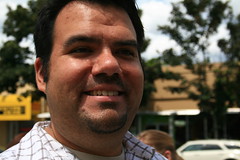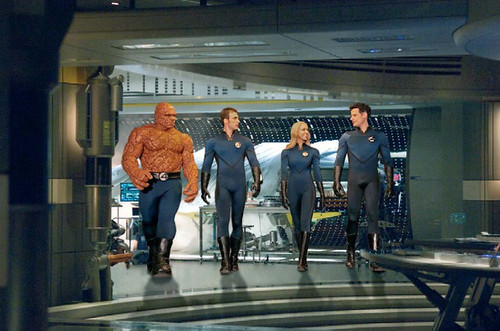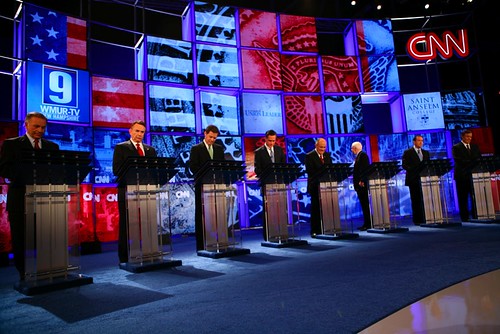We're in a time of war. The military is having problems meeting its recruitment goals. Its even lowering its standards and discharging much needed linguists. And yet none of the GOP candidates were willing to reconsider DADT. Some even defended continued discrimination against the men and women who are currently serving (from CNN transcript, clipped and bold added):
[SCOTT SPRADLING, WMUR MODERATOR]: Congressman Paul, a question for you.
Most of our closest allies, including Great Britain and Israel, allow gays and lesbians to openly serve in the military. Is it time to end don't ask/don't tell policy and allow gays and lesbians to serve openly in the U.S. military?
[RON] PAUL: I think the current policy is a decent policy.
And the problem that we have with dealing with this subject is we see people as groups, as they belong to certain groups and that they derive their rights as belonging to groups.
We don't get our rights because we're gays or women or minorities. We get our rights from our creator as individuals. So every individual should be treated the same way.
So if there is homosexual behavior in the military that is disruptive, it should be dealt with.
But if there's heterosexual sexual behavior that is disruptive, it should be dealt with.
So it isn't the issue of homosexuality. It's the concept and the understanding of individual rights. If we understood that, we would not be dealing with this very important problem.
(APPLAUSE)
[WOLF BLITZER, CNN MODERATOR]: Governor Huckabee, I want you to weigh in as well.
Do you believe it's time to allow homosexuals to serve openly in the United States military?
HUCKABEE: Wolf, I think it's already covered by the Uniform Code of Military Conduct. I think that's what Congressman Paul was saying: It's about conduct; it's not about attitude.
. . . [HUCKABEE ATTEMPTS TO CHANGE TOPIC, BLITZER STEERS HIM BACK TO DADT]
BLITZER: . . . But right now, we're talking about allowing gays to serve openly in the military. But you're opposed to that?
HUCKABEE: I just said I think it's a matter -- it's not -- you don't punish people for their attitudes; you punish them if their behavior creates a problem. And it's already covered by the Uniform Code of Military Conduct.
BLITZER: So you wouldn't change existing policy.
HUCKABEE: What?
BLITZER: You wouldn't change existing policy.
HUCKABEE: I don't think that I would. I think it's already covered by the existing policy that we do have, in fact.
BLITZER: Mayor Giuliani, recently we've learned that several talented trained linguists -- Arabic speakers, Farsi speakers, Urdu speakers -- trained by the U.S. government to learn those languages to help us in the war on terrorism, were dismissed from the military because they announced they were gays or lesbians.
Is that, in your mind, appropriate?
GIULIANI: This is not the time to deal with disruptive issues like this.
Back in 1994 we went through this. And it created a tremendous amount of disruption. Colin Powell, I think, was still the head of the Joint Chiefs of Staff before he left at the beginning of the Clinton administration.
He came to the view that this was a good policy.
And I think in time of war, in a time where we're trying to deal with this transition to a new kind of warfare that we have to be fighting -- and we haven't gotten all the way there yet. We need a hybrid army, we need to look at nation-building as part of what we have to teach our military. I don't think this would be the right time to raise these issues.
BLITZER: Thank you.
GIULIANI: And I think we should rely on the judgment of our commanders in a situation like this. They know what's disruptive and what's not. And at a time of war, you don't make fundamental changes like this.
BLITZER: Thank you, Mayor.
Governor Romney, the mayor referred to the don't ask/don't tell policy, which was implemented during the Clinton administration, after Bill Clinton became president.
In 1994, you were quoted as saying that you advocated gays being able to serve openly and honestly in our nation's military.
The question to you is, do you still feel that way?
ROMNEY: No, actually when I first heard of the don't ask/don't tell policy I thought it sounded awfully silly and didn't think that'd be very effective, and I turned out to be wrong.
It's been the policy now in the military for, what, 10, 15 years? And it seems to be working.
And I agree with what Mayor Giuliani said, that this is not the time to put in place a major change, a social experiment, in the middle of a war going on.
I wouldn't change it at this point. We can look at it down the road. But it does seem to me that we have much bigger issues as a nation that we ought to be talking about than that policy right now.
BLITZER: Senator McCain, you've been involved in military matters virtually your whole life. What do you say?
MCCAIN: We have the best-trained, most professional, best- equipped, most efficient, most wonderful military in the history of this country. And I'm proud of every one of them.
(APPLAUSE)
There just aren't enough of them. So I have to rely on our military leadership, in whom we place the responsibility to lead these brave young Americans in combat as we speak.
So I think it would be a terrific mistake to even reopen the issue. It is working, my friends. The policy is working.
And I am convinced that that's the way we can maintain this greatest military. As much as I revere the greatest generation, as much as I love my own generation, this is the very best. Let's not tamper with them.
BLITZER: Is there anyone here who believes gays and lesbians should be allowed to serve openly in the United States military?
If you do, speak up now.
. . .
Stunning, deafening silence.


































































